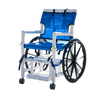Bridging the Distance: Innovative Ways to Care for Loved Ones Remotely

Communicating Needs
Initiating a candid conversation with your loved one is the cornerstone of effective remote caregiving. You can tailor your approach to offer meaningful support by understanding their specific needs and preferences. Regular communication fosters a deeper connection and ensures your care remains both relevant and personal.
Some common needs seniors have include:
1. Physical Activity: Regular exercise, such as walking or yoga, maintains flexibility, strength, and balance, preventing chronic diseases and boosting overall well-being.
2. Healthy Nutrition: A balanced diet with fruits, vegetables, lean proteins, and whole grains supports seniors' health and energy levels, which helps prevent conditions like diabetes and heart disease.
3. Social Connections: Strong social ties reduce loneliness and depression, improve cognitive function, and provide crucial emotional support for seniors.
4. Mental Stimulation: Engaging in activities like reading, puzzles, or learning new skills helps maintain cognitive health to help prevent decline and foster a sense of purpose.
5. Regular Health Check-Ups: Routine medical appointments monitor overall health, manage chronic conditions, and ensure timely preventive care—all of which contribute to better health outcomes.
Document Management Tools
Managing essential documents from a distance can be challenging. Introduce your loved one to online tools that simplify this process. Emphasize the efficiency of PDF merging tools, which reduce the hassle of managing multiple files and ensure important documents are always within reach. Check this out to streamline your document management and keep vital records at your fingertips.
Investing in smart home upgrades can significantly enhance the safety and comfort of your loved one's living environment. Consider advanced doorbells and security cameras, which provide real-time monitoring and alerts. These technologies offer added security and allow you to remotely check in on your loved one's well-being.
Medical Alert Systems
Safety should always be a top priority, and a medical alert system is a safety net for your loved one. These systems provide immediate assistance in emergencies, offering you and your loved one peace of mind. Knowing that help is just a button press away can significantly affect their overall well-being.
Medication Management
Managing medications from a distance can be challenging, but there are specialized devices designed to assist in this task. These devices ensure that your loved one takes their medication on time and in the correct dosage. This promotes their health and eases your worries about their well-being.
Telehealth Platforms
Access to healthcare is a fundamental need, and technology has made it more accessible than ever. Advocate for the use of telehealth platforms, which connect your loved one with healthcare professionals for consultations and check-ups. Telehealth saves time and effort and ensures your loved one receives the necessary medical attention, even when you can't be there in person.
Online Support Groups
Caring for a loved one from a distance can be emotionally challenging. Encourage your loved one to find online support groups and communities for caregivers. These platforms provide a space for sharing experiences, seeking advice, and offering emotional support. Connecting with others facing similar challenges can be a source of strength and resilience for both you and your loved one.

- Dansons Medical Support


 Lifts
Lifts
 Patient Lifts
Patient Lifts
 Stand Assists
Stand Assists
 Standing Aids
Standing Aids
 Slings
Slings
 Parts & Accessories
Parts & Accessories
 Wheelchairs
Wheelchairs
 Ergonomic
Ergonomic
 Portable
Portable
 Reclining
Reclining
 Standing
Standing
 Sporting
Sporting
 Bariatric
Bariatric
 Ramps
Ramps
 Modular
Modular
 Portable
Portable
 Parts & Accessories
Parts & Accessories
 Walking Aids
Walking Aids
 Walkers
Walkers
 Canes
Canes
 Crutches
Crutches
 Parts & Accessories
Parts & Accessories
 Scooters
Scooters
 4-Wheel
4-Wheel
 Folding
Folding
 Parts & Accessories
Parts & Accessories
 Nursing
Nursing
 Pregnancy Comfort
Pregnancy Comfort
 Self-Care
Self-Care
 Pump Parts
Pump Parts
 Exercise Equipment
Exercise Equipment
 Treadmills
Treadmills
 Walking Pads
Walking Pads
 Rowing Machines
Rowing Machines
 Strength & Conditioning
Strength & Conditioning
 Massage Chairs
Massage Chairs
 Saunas
Saunas
 Hot & Cold Tubs
Hot & Cold Tubs
 Stethoscopes
Stethoscopes
 Surgical Instruments
Surgical Instruments
 Forceps
Forceps
 Scalpels
Scalpels
 IV Poles
IV Poles
 Oxygen
Oxygen
 Beds
Beds
 Electric Beds
Electric Beds
 Standing Beds
Standing Beds
 Mattresses
Mattresses
 Bed Accessories
Bed Accessories
 Bed Parts
Bed Parts
 Chairs
Chairs
 Medical Recliners
Medical Recliners
 Phlebotomy Chairs
Phlebotomy Chairs
 Stools & Task Chairs
Stools & Task Chairs
 Parts & Accessories
Parts & Accessories
 Tables
Tables
 Overbed Tables
Overbed Tables
 Medical Tables
Medical Tables
 Recovery Couches
Recovery Couches
 Cabinets
Cabinets
 Pool
Pool
 Pool Lifts
Pool Lifts
 Pool Fitness & Therapy
Pool Fitness & Therapy
 Pool Access Chairs
Pool Access Chairs
 Slings
Slings
 Parts & Accessories
Parts & Accessories
 Bath
Bath
 Toileting Aids
Toileting Aids
 Bath Lifts
Bath Lifts
 Shower Seats
Shower Seats
 Parts & Accessories
Parts & Accessories
 Portable Shower
Portable Shower
 Dansons Products
Dansons Products
 Transfer Aids
Transfer Aids
 Cushions
Cushions
 eBooks
eBooks
 Helpful Articles
Helpful Articles
 Reviews
Reviews
 Contact Us
Contact Us
 Create Account
Create Account
 Request a Quote
Request a Quote

Comments 0